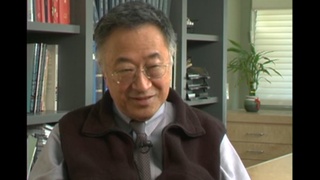Interviews
Allyship after camp
When we came back from camp, um, San Bernardino does not have a Japanese community, right, but there was a Chinese market, and it was run by a family called the Kwoks. We could not have our store without them because they were the only butcher and they had a, a butcher store on, uh, a butcher thing, and they eventually opened up what is, a, a pretty big market, there used to be, called Palace Market, real supermarket, which is one of the first ones out there and everyone in our family, me, my brother, my sisters, both of them, all worked there.
But after the war, there were certain companies that wouldn’t sell. You know, my father, still does not like, um, it’s Langendorf, or Pepsi. Because they asked to, to get their products in the store and they said, we don’t sell to Japs. We could not get meat.
So, they said, we’re here, you know. So, we got to be friends, my sister especially became friends with Rosemary Kwok, and they became good friends. But we would have to walk, it must have been over a mile, I can’t remember, we had to go through a meadow get up into a thing. And my father would order the meat and we’d then put the meat on our shoulders. And we were relatively small kids, all of us had to kind of lug it through the hot sun to our store. And that’s how we got our meat products there, you know.
Date: September 8, 2011
Location: California, US
Interviewer: John Esaki, Kris Kuramitsu
Contributed by: Watase Media Arts Center, Japanese American National Museum
Explore More Videos

442 soldiers visiting U.S. concentration camps
(b. 1924) Political scientist, educator, and administrator from Hawai`i

Change in attitudes after World War II
(b. 1924) Political scientist, educator, and administrator from Hawai`i

Thoughts on the post-9/11 atmosphere in the U.S.
(1930-2018) Nisei born in Peru. Taken to the United States during WWII.

Grandfather's arrival in the U.S., experiencing discrimination
(b. 1939) Japanese American painter, printmaker & professor

Receiving a negative reaction from father upon asking about World War II experience
(b. 1939) Japanese American painter, printmaker & professor

Dealing with racism within army unit in Korea
(b. 1939) Japanese American painter, printmaker & professor

Collection of artifacts depicting racial stereotypes influences art
(b. 1939) Japanese American painter, printmaker & professor

Encountering racial discrimination at a public swimming pool
(b. 1923) Nisei from Washington. Resisted draft during WWII.

Making the decision to resist the draft
(b. 1923) Nisei from Washington. Resisted draft during WWII.

Anti-Japanese sentiment at the time of World War II
(b. 1918) Issei businessman in Canada

Social activities in Tashme
(b.1920) Japanese Canadian Nisei. Established the Ikenobo Ikebana Society of Toronto

Undergraduate studies interrupted following Pearl Harbor
(b. 1921) Nisei businessman. Established "Made in Oregon" retail stores

Difficulty getting work during World War II
(b. 1921) Nisei businessman. Established "Made in Oregon" retail stores

Difference between experiences of youth and older people in WWII camps
(b.1929) Pioneer medical researcher in tissue transfer and organ transplantation.

His experiences in Chicago after WWII
(b.1929) Pioneer medical researcher in tissue transfer and organ transplantation.
